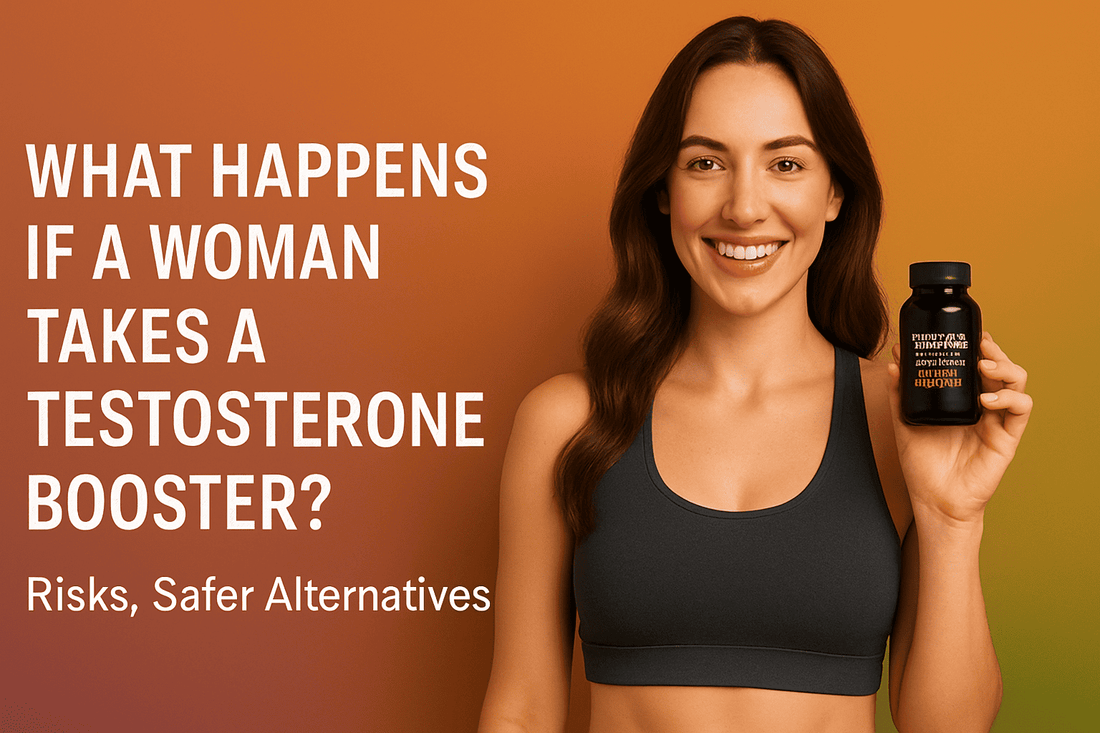
What Happens If a Woman Takes a Testosterone Booster? — Risks, Safer Alternatives
Share
Quick Answer
- Most “testosterone boosters” are designed for men. In women, pushing androgens can trigger acne, oily skin, scalp hair thinning, unwanted facial/body hair, voice changes, and irregular periods—especially if you’re already androgen-sensitive (e.g., PCOS).
- If your goals are energy, mood, libido, or exercise recovery, you’ll usually get safer, steadier results from sleep, resistance training, protein, stress management, and non-androgenic supplements (e.g., COA-verified shilajit for energy/recovery; ashwagandha for stress/sleep).
- Avoid androgen-raising products in pregnancy, breastfeeding, adolescents, hormone-sensitive cancers, uncontrolled thyroid/liver disease, or if you’re on anti-androgens/contraceptives—talk to your clinician first.
Androgens in women
Women naturally produce small amounts of testosterone (ovaries + adrenals). It supports libido, mood, bone, and muscle—but a little goes a long way. Raising androgens too much increases the chance of virilizing effects (male-pattern features) and cycle disruption.
What happens if a woman takes a testosterone booster?
Possible benefits (goal-dependent)
- Slight uptick in motivation/drive, training output, or libido (not guaranteed).
- If a product focuses on stress/sleep (e.g., adaptogens) or nutrient repletion (vitamin D, zinc when low), you might feel steadier energy—that’s not the same as raising testosterone.

Common risks & side effects (dose and sensitivity matter)
- Skin/hair: acne, oily skin, scalp hair thinning (male-pattern), unwanted facial/body hair.
- Cycles: irregular/shortened cycles, spotting.
- Voice: hoarseness/deepening (may be irreversible in high-androgen states).
- Mood: irritability, anxiety, sleep changes.
- PCOS: can worsen metabolic/androgen symptoms.
Over-the-counter “boosters” vary wildly. Some include DHEA/androgenic herbs that are not appropriate for many women; others are just vitamins/adaptogens. Always read labels.
Safer paths to the same goals
Lifestyle multipliers (always first):
- Sleep 7.5–8.5 h; protein 1.4–1.8 g/kg; lift weights 2–4×/week; NEAT walks; manage alcohol; stress hygiene.
Non-androgenic supports (evidence-informed):
- COA-verified shilajit (purified resin): supports daytime energy & recovery without being overtly androgenic. Start 125–250 mg/day for 3–7 days → up to 250–500 mg/day if tolerated.
- Ashwagandha (standardized): stress/sleep support; may help perceived well-being and sexual function in some women.
- Iron/B12/Vit D (if low): correcting deficiencies often helps fatigue/hair quality more than any hormone-tilting product.
- Creatine monohydrate (3–5 g/day): safe for women; supports strength and cognition without androgenic effects.
- Avoid during pregnancy/breastfeeding unless your clinician explicitly approves. If you have PCOS, thyroid, liver, or hormone-sensitive conditions, get medical guidance first.

FAQ
Q: Can a woman safely take a testosterone booster?
A: It’s not recommended without clinician guidance. Many products can increase androgenic side effects (acne, unwanted hair, scalp thinning) and disrupt cycles.
Q: Will a booster fix low libido?
A: Libido is multifactorial (sleep, stress, relationship, meds). Non-androgenic approaches (sleep, stress support, therapy, shilajit/ashwagandha, nutrient repletion) are safer first-line options.
Q: Is shilajit okay for women?
A: Yes, with care. Use a COA-verified purified resin; start 125–250 mg/day, avoid in pregnancy/breastfeeding, and stop if any androgenic signs appear.
Q: I have PCOS. Should I try a T booster?
A: Generally no. PCOS already features elevated androgens; boosting further may worsen symptoms. Work with your clinician on weight, insulin sensitivity, and cycle regulation.
Conclusion
- Women do need some testosterone, but “boosting” it with male-oriented products often backfires (acne, unwanted hair, cycle issues, scalp thinning).
- For energy, mood, libido, and training, prioritize sleep, protein, resistance exercise, stress control, and non-androgenic supports (e.g., COA-verified shilajit; ashwagandha; correct iron/B12/Vit D if low).
- If you suspect a hormone imbalance, see a clinician. A targeted plan beats guesswork—and keeps your hair, skin, and cycles happy.


